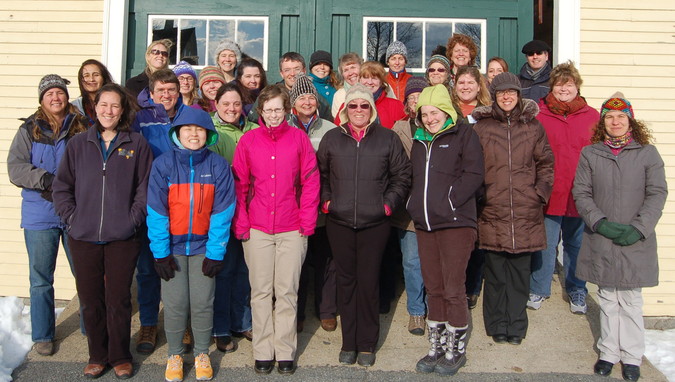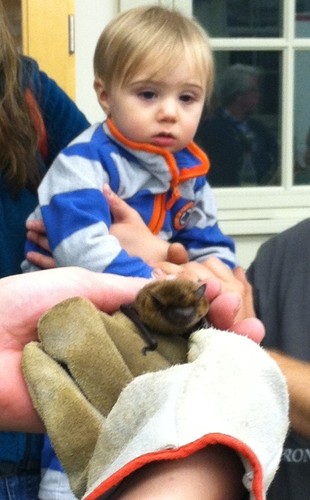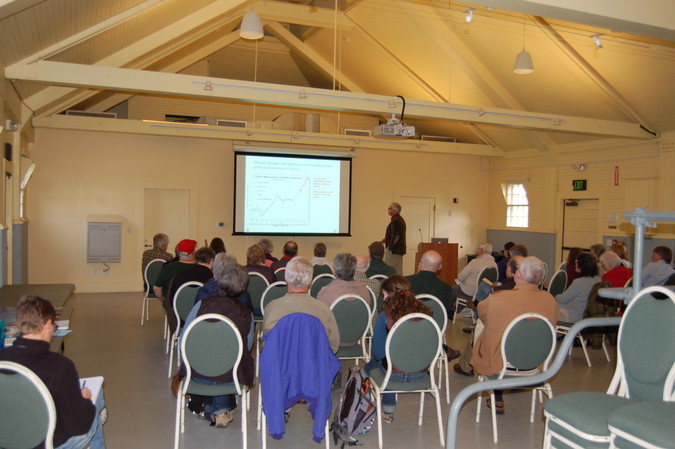The Wrack
The Wrack is the Wells Reserve blog, our collective logbook on the web.
The Wrack is the Wells Reserve blog, our collective logbook on the web.
The National Association of Interpretion defines interpretation as "a mission-based communication process that forges emotional and intellectual connections between the interests of the audience and the meanings inherent in the resource." The year-round education programming at the Wells Reserve aims to build these meaningful connections.

Last month, the Reserve hosted 27 interpreters from across the country and around the world for a Certified Interpretive Trainer workshop facilitated by the National Association of Interpretation. Talented and creative professionals working at nature centers, aquariums, battlefields, state parks, and other interpretation centers in Hong Kong, France, Chile, California, Montana, Utah, and other locales joined together for a week of wonderfully intense learning.
For the last 6 years, myself and a group of trained citizen scientist have been monitoring marine invasive species on docks, rocky shores, and tide pools as part of the Marine Invader Monitoring and Information Collaborative, or MIMIC.
This past Saturday evening, over 20 community members participated in the "Bats: Friends of the Evening Sky" program offered in partnership with the Center for Wildlife. We all learned about the many myths surrounding bats and the real truths (they don't fly into human hair, there are only 3 species of vampire bats among the over 1,200 species of bats worldwide, and vampire bats do not live in the United States—they live in tropical climates and prey primarily on livestock). 
We were amazed to learn, too, that Maine's insectivorous bats eat 1,000 mosquitoes in a single night! The next time a mosquito bites you, think of all the mosquito control bats provide us!
 The following was published in the Biddeford-Saco Journal Tribune Sunday edition, 10/6/13:
The following was published in the Biddeford-Saco Journal Tribune Sunday edition, 10/6/13:
School has started again, which means it’s group visit season at the Wells Reserve at Laudholm. Those schools fortunate enough to have bus rental money are sending classes our way, and our team of educators are taking the kids out on the trails, down to the beach, and through the science and history of this 360-year-old place.
For a long time, I didn’t understand what “environmental education” was. I’m a perennial skeptic, particularly when it comes to claims from my own liberal brethren, so, over the past ten years of my environmental career, I’ve always taken my colleagues’ proscriptions with more than a grain of salt. What finally convinced me to start applying their lessons was, of course, that grand old motivator of cynic and sucker alike: money.
The nearly 40 people who attended Dr. Stephen Mulkey's "Crisis and Opportunity in the Environmental Century" Climate Stewards lecture in mid-May left with a clear message: We are out of time and we must act now.
Mulkey began his talk with a quote from David Orr, "All education is environmental education… by what is included or excluded we teach the young that they are part of, or apart from, the natural world."  Mulkey spoke of his (incredible) work as President of Unity College, becoming the first college in the country to divest from fossil fuels, as well as recently integrating climate change education across the entire curriculum. Unity's students study the complexity of interactions among the economy, society, and nature--a framework for the future known as "sustainability science."
Mulkey spoke of his (incredible) work as President of Unity College, becoming the first college in the country to divest from fossil fuels, as well as recently integrating climate change education across the entire curriculum. Unity's students study the complexity of interactions among the economy, society, and nature--a framework for the future known as "sustainability science."
Year 4 of the popular teacher training program.
We're inviting experts on climate literacy, climate politics, and practical solutions to climate-change challenges to Mather Auditorium for a series of thought-provoking and action-inspiring lectures. Please plan to join us — and bring along a friend. Follow the links below for details on each lecture.
Last week, the Reserve hosted twelve middle and high school teachers from New Hampshire, Massachusetts, Rhode Island, New York, and Louisiana for Teachers on the Estuary (TOTE) II, a field-based workshop focused on estuary and watershed education. This is the third TOTE workshop held at the Reserve, but unlike the first two, this year's TOTE was only open to teachers who had already participated in a New England TOTE workshop at either the Wells National Estuarine Research Reserve (NERR), the Waquoit Bay NERR in Massachusetts, or the Narragansett Bay NERR in Rhode Island.
This summer the Wells Reserve's Interpretive Education Associate, Paige Rutherford, revamped and restructured the Guided Tours program for the season. Paige prepared all the docent training materials, organized outlines, templates, scripts, and resources, and held training sessions in late June.
The newly trained volunteers will be leading History of a Saltwater Farm, Life Between the Tides, Secrets of the Salt Marsh, and Nature Walk tours as well as other guided tours throughout the summer!